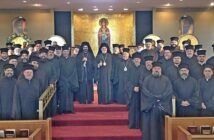Source: The National Herald
by Theodore Kalmoukos, Special to The National Herald
The preservation of small Greek Orthodox parishes, and their ability to continue to exist in the United States, is very serious matter which should concern all of us as members of both the Church and the Greek American Community.
Some of our small parishes have already gone down on a withering path.
Among them are parishes which flourished in the past, especially during the early decades after their establishment by Greek immigrant pioneers. With the passing of time and changing of demographic circumstances, and the loss of jobs in smaller communities due to the advent of the high-tech age, parishes with 100-500 families in the past have today ended up with 50-70 families or less.
Like the rest of American society, younger generations of Greek Americans have moved to larger cities and areas with job availability.
To be fair in our assessment, new parishes were instituted in other areas either in the same state, or in other states. For example, Florida has become a place of retirement of many Greek Americans. Thus, the establishment of new parishes in that state is a noteworthy phenomenon.
But the general withering of the parishes which have become smaller and smaller over time, to the point where even their very existence is in question, is an issue that neither the Holy Eparchial Synod nor the Archdiocesan Council, both presided over by His Eminence Archbishop Demetrios of America, have spent the time and the resources to responsibly consider.
Manifold problems face our small parishes. Finances are both pressing and most depressing. In many cases, 200-300 families are working just to support one family, the priest’s family.
The plain truth is that those small parishes have difficulties making ends meet, even with their annual Greek festivals.
As a matter of fact, even large parishes, which consider themselves financially stable, have difficulties meeting their annual budgetary requirements. Even some of their parish priests consider Greek festivals as “merely ethnic” and utter all kinds of other foolishness about Greek Orthodox cultural identity. But when it comes to the money generated by Greek festivals, they become speechless because, from the proceeds, their fat salaries are supported. What hypocrisy.
That said, small parishes can not afford to sustain a fulltime priest, especially in this day and age, when clergy salaries in many cases have reached the level of high-ranking corporate salaries, plus benefits.
Political correctness aside, the fat salaries that some Greek Orthodox communities pay their priests is a big attraction for convert priests, who prefer to be appointed into the Greek Orthodox Archdiocese, but and not in the other Orthodox jurisdictions.
The bottom line is that Greeks Americans are able to pay well, so an unfortunate consequence of that affluence and ability is that the holy priesthood is viewed as another profitable profession.
I do not want to be misunderstood. I am not against priests making decent salaries to support their families and themselves. I firmly believe that a priest and his family should have the means to live a decent and dignified life. What I question is the exaggeration, or rather the transformation, of the holy priesthood into another type of secular profession. But the holy priesthood is a ministry, not a career, and by nature, it involves a high level of service and material sacrifice.
It is almost certain that most priest today prefer not to minister to small parishes The vast majority of our priests, and especially those who have graduated from the Theological School in recent years, are looking from the start of their ministry to go into large parishes and cathedrals. Sermons on the sacrificial nature of the holy priesthood and similar topics are thereby rendered just theories and empty words. The reality is completely different, however.
Not all of the professors and administrators (several of whom are also priests) at the Seminary can be categorized as high-salary professionals, but can those who do command high salaries set the right example for our seminarians? Are they? Has their salary and life of material comfort made them complacent? These are hard questions which they need to ask themselves, and which the community also needs to ask.
The issue is not salary, in and of itself. Over time, of course a professor’s salary must go up. The issue is whether the system within our ecclesiastical framework has been corrupted by the temptation of material comfort.
Are seminarians being lured away from their sense of mission by bad example and the promise of material comfort and security? Are potential seminarians enrolling in the seminary because they want to be paid well for civic duty? Are they confusing civic duty with priestly ministry?
Here are some practical proposals:
1. The Holy Eparchial Synod might consider requiring that all the newly ordained priests to serve initially for five years in small parishes.
2. The Archdiocese should establish a fund, which will supplement the priests’ salaries.
3. Two or more parishes within short distances of each other should merge. I see this becoming a necessity in the years ahead. Instead of being tossed to and fro by necessity, however, let us be proactive about it, before our larger churches and community centers become bird nests.
4. The leadership of the Archdiocese should accept that the Church is in great need of internal mission and strategy of survival.
It is so sad to expend so much, energy and resources at the biennial Clergy-Laity Congress and then not deal with the real issues confronting the Church and the community of faith at-large. We go to fancy hotels without any preparatory work, without a genuine agenda even, and time after time, we argue about the Charter, the Uniform Parish Regulations, Archon breakfasts and Leadership 100 banquets.
When are we going to get serious at some point and try to deal with the real issues challenging our Church and community today? This question will remain unanswered until real leadership manifests itself somehow, some way from somewhere.
Leadership is the key for dealing with the issue of small parishes, which can be viewed as part of a grass-roots effort. Leadership is the key for resolving all of the problems the Church in America is facing, many of which are self-imposed. But those who are already in leadership positions, who have not done a good job and who, because of their failure, no longer deserve to be in those positions, choke out potential new leaders.
A little humility is in order. They should set their egos aside; acknowledge their shortcomings; recognize others talents and value; and give newcomers a chance. There is no shame in admitting our mistakes. There is only shame when we do not try to correct ourselves.
Originally published on December 10, 2004.
[subscribe2]


